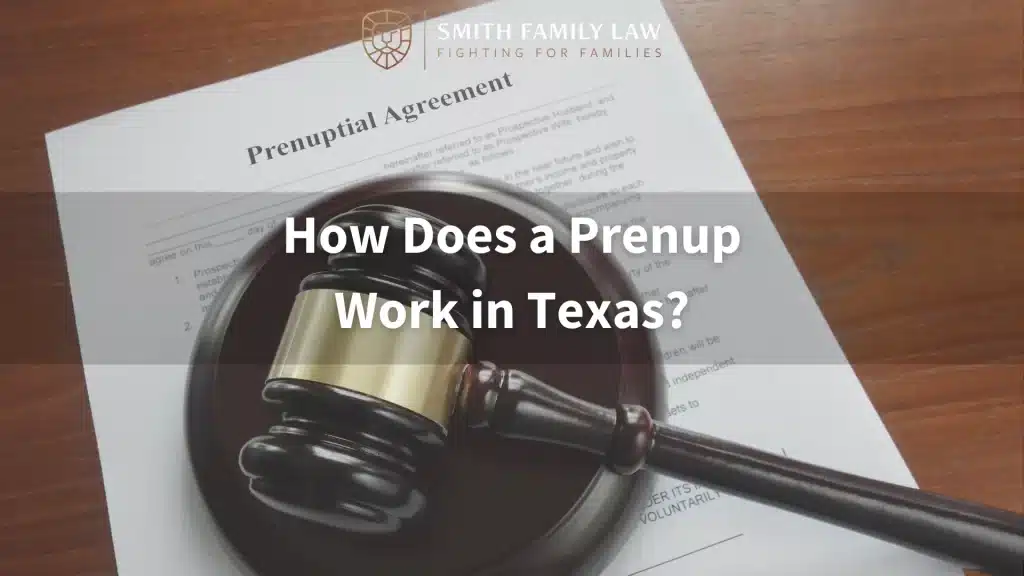
Planning for divorce typically isn’t on the to-do list for couples exchanging vows, with hopes for love and happiness taking center stage. Still, if you live in a community property state like Texas, there are some financial realities to consider before walking down the aisle. Prenuptial agreements in Texas protect the assets and property of both partners in the event of a divorce. A prenup can also outline the disposal of community property and allocate assets and debts equitably. A family law attorney can help you understand how a prenup works in Texas and how this legal arrangement can give you peace of mind.
Understanding Prenuptial Agreements in Texas
A prenuptial agreement is a contract between two as-yet unmarried individuals that details the disposition of property should the couple divorce. Thorough discussions pave the way for a prenup agreement, which both parties sign before tying the knot. This document springs into action as soon as their marriage becomes official.
The Texas Uniform Premarital Agreement Act addresses the laws that apply to prenuptial agreements. Instead of letting the fate of pre-marital property hang in the balance, a premarital agreement actively protects ownership of what each spouse brings into the marriage. It also clearly defines how each spouse can use, transfer, or dispose of specific assets. This could include deciding who owns the marital home or how to divide retirement accounts.
A prenup in Texas may also cover:
- Which spouse has the right to any property acquired during the marriage
- Which spouse should settle any debts acquired in the marriage
- How to divide property
- Whether one spouse will be entitled to spousal support (alimony)
- Are any specific buy-sell agreements for shared property or businesses
A premarital agreement can cover how the couple will address finances while married, such as whether there will be joint accounts or investments. It may even dictate which spouse is financially responsible for certain expenses (such as individual student loan payments).
Some prenups also have “infidelity clauses,” or stipulations that negate the prenup. For example, if one spouse is unfaithful, they forfeit their right to specific assets.
Protecting the child’s well-being takes precedence over dividing assets. Therefore, child support is kept separate from the couple’s property division agreement. Texas law acts as a shield, ensuring a prenuptial agreement cannot negatively impact a child’s right to financial support.
While a division of parenting time for children and child support are not part of a Texas prenup, custody of pets can be included in the agreement. Texas law regards pets as property, so their ownership can be assigned in the agreement.
Creating a Prenuptial Agreement in Texas
Never underestimate the importance of meticulously crafting a prenuptial agreement, considering its binding nature similar to a business contract. Texas law dictates that a prenuptial agreement is enforceable in writing, signed by both parties and created in contemplation of an upcoming marriage. Because this is a legally binding contract, it’s in your best interests to have an experienced family law attorney draft a prenup for you or review any prenup your partner wishes you to sign.
An attorney can determine whether the agreement is in your best interests or create one that protects your separate property from your spouse-to-be.
One partner’s attorney typically drafts the Texas prenup, and then a lawyer representing the other spouse reviews it. A prenuptial agreement to protect the separate property makes sense if one partner has significantly more assets than the other. A prenup can be a sensible precaution if one partner has substantial debt while the other is debt-free. The prenup can ensure that only the debtor partner is responsible for settling their debt in the event of a divorce.
A premarital agreement can act as a roadmap for converting a separate property into a joint property. Couples can outline conditions in the agreement, like using proceeds from selling pre-marital assets, to fund shared purchases like a home.
Enforcing Prenuptial Agreements in Texas

The prenup may be nullified if it is unconscionable. To be unconscionable, any of these conditions must have existed:
- The other party withheld crucial financial information about their property and debts, depriving the first party of a fair and reasonable disclosure.
- One party did not expressly waive, of their own volition, any right to have full financial disclosure from the other.
- One party could not have reasonably had full knowledge of the other’s financial situation.
Honesty is the best policy, especially when it comes to prenups. Hiding assets or major debts is a recipe for court battles and potentially nullifying the entire agreement.
Only by demonstrating either forced signing or lack of knowledge about major debts or assets can the challenging partner expect the judge to invalidate the prenup. An attorney can help you challenge the validity of a prenup.
If a marriage crumbles due to its legal invalidity, the once-solid ground of a prenup might start to crack. Under Texas law, prenuptial agreements can only be upheld in court if doing so promotes fairness for both spouses.
Modifying Prenuptial Agreements in Texas
To change or cancel a prenup after it takes effect, both spouses must sign a new written agreement together. Any amendment or revocation in writing and signed by both parties would be as enforceable as the original contract.
Choose an Experienced Texas Family Law Attorney to Draft Your Prenup
Do you need more information about how a prenup works in Texas? Do you have questions specific to your financial situation and relationship? Contact Smith & Bledsoe Family Law today at (512) 277-3166 for a confidential consultation with our team of family law attorneys experienced in drafting prenuptial agreements.
Related Reading: